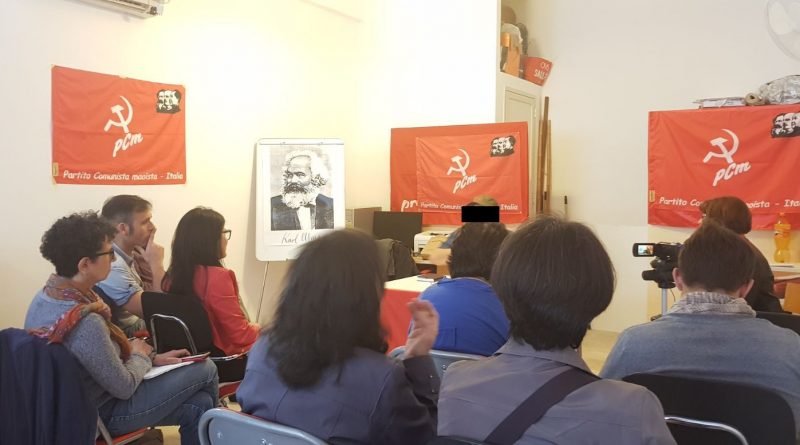Italy, Palermo: Speech of the PCm Italy at the Celebration of the 200th Anniversary of Karl Marx
MARX AMONG THE PROLETARIANS, THE WOMEN, THE YOUTH
a speech by the PCm Italia at the celebration of the 200th held in Palermo
Comrades,
In the 200th anniversary of the birth of Karl Marx, we honor and hail his name by studying and above all fighting, being part of that proletarian army for which Marx has worked all the lifetime, and by making universal and permanent his message of liberation of the oppressed classes.
In addition to this great 200th, the 50th anniversary of the 1968 recurs this year. The ’68 represented for the bourgeoisie what Marx describes in the Manifesto as the “spectre is haunting Europe …”. The ’68 embodied the revolutionary message of the communists, and the communists in different countries, many young and new communists, made it strong and terrible, showed that it was right to rebel, that even in the imperialist citadels of the wealth and richness – apparent as we know – the ideas of revolt had never died, and indeed they had to be taken up. The influence of Marx and the Marxists at that time, who since then took the name of Maoists, was one of the keys of that rebellion, the instrument that theoretically embodied the slogan “It is right to rebel”.
Anyone who has read something about his life, his books, letters, the memoirs about Marx knows very well that he was a communist very little inclined to make chatter, not inclined to be revered and celebrated. He reacted with some annoyance to the flatterers, he knew that many who called themselves Marxists or revolutionaries did it for themselves, i. e. they exalted Marx to exalt themselves – which is really the most despicable to deny Marx. We must reject this way of being “Marxists”.
This bicentennial is a rediscovery of Marx also by the bourgeoisie, but not only. For example, some of you have watched the movie “The young Karl Marx”. A movie to watch, because it manages to make vivid the image of what Marx was, of the life that he really did. In general, Marx did not want anyone talk about his life. It is known that he was angry when his wife, Jenny, was forced to tell the comrades, to those who owed him money for his writings, the difficult conditions of health, of misery that Marx lived and he got angry just to be forced to work in those conditions.
Marx had an infinity of diseases. Escaping from one country to another for expulsions, his health deteriorated. His living conditions were hard in all the countries he went to, where he had to fight daily with poverty.
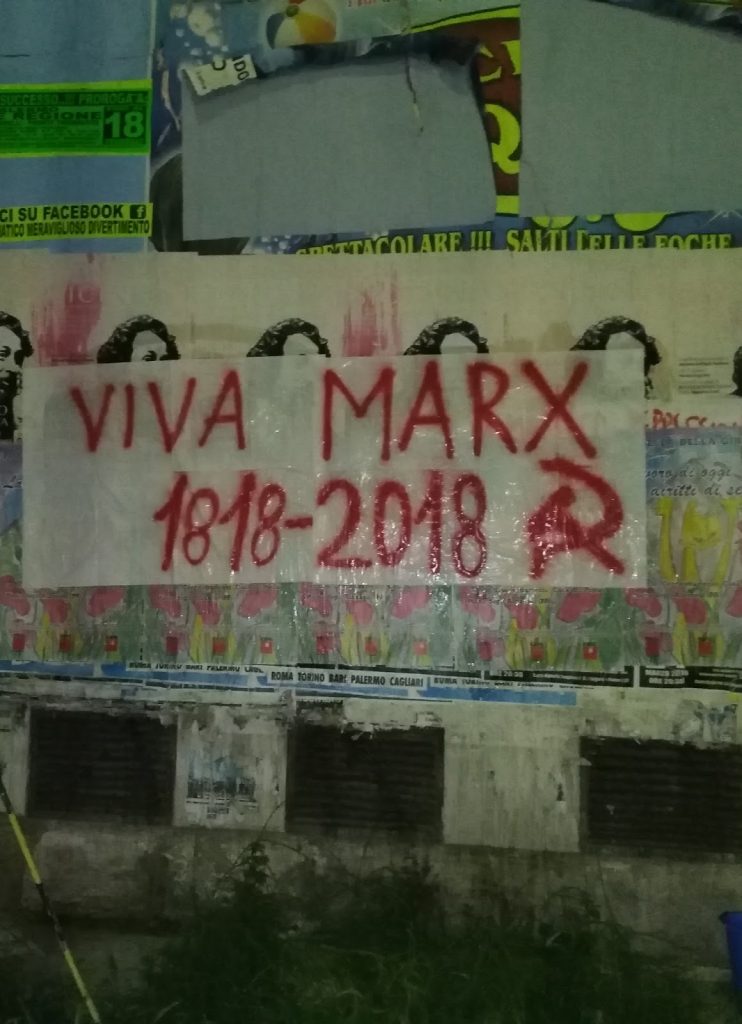 But Marx has never considered these conditions to be an obstacle. Of course, compared to the programs of study and work he had, a life was not enough. In his plans he had to write at least twice as many works as he wrote.
But Marx has never considered these conditions to be an obstacle. Of course, compared to the programs of study and work he had, a life was not enough. In his plans he had to write at least twice as many works as he wrote.
Marx was interested in everything, even, just before his death, about animals, plants and more, because it was indispensable for him to give on everything a scientific explanation corresponding to the social history of humanity. He was very fastidious in doing thing properly. If he wanted to read a book by a Russian author, he had to study Russian language because he thought he had to read and understand as well as possible. This led him to speak many languages. Just as, for example, before writing about the relationship between ecology and production, Marx felt he had to study all the books published on the subject. “I swallow books and then spit them out,” he said, “this is an indispensable work if I really want to write about something”. Here is the absolute scientific rigor with which Marx built all his theoretical work.
When it is said that Marx was a revolutionary, the first revolutionary attitude he got was toward his work, the study as a work to be done to the end, which had to be placed before anything, even his life, his health problems. He put everything else in second place. Jenny acounts that he often forgot to eat.
Marx had very clear that the revolution must have the tools to be realized, which it was not an “idea”, the one that many before Marx and after Marx have had. To Revolutionize a world that is not good and a more ancient idea than Marx, we can say that it is born with the first division into classes of society. But for Marx the revolution needs a scientific theory, an ideology, an ability to analyze political facts, to bring them back to the root causes, and in the analysis of these causes to find the road. Despite being a scientist, Marx is like a frantic militant, every movement that develops in the working class gets his interest, he can not wait to go there. He lives in tune with the struggles developed in those years in Germany, in Europe, in England and takes position on them. He is not a prophet, he is a militant. For example, regarding the Paris Commune, until a few days before the revolution, Marx takes very critical view of French comrades, for their theories and what they are doing. But, when that strange mixture produces the Commune of Paris, when flesh-and-blood workers take the power in Paris and in a few days they take over all the levers of the handling of society, writing overnight the laws they had always aspired; when the Commune becomes a mortal danger for the bourgeoisie and the ruling classes in the whole world, such that they will put in motion the troops that will cancel the Commune and transform Paris it into a gigantic cemetery, with thousands and thousands of dead workers; when Paris had been in the hands of the working class for just over two months; then Marx begins to study what really happened, he begins to look inside what the workers have done during those extraordinary days, and he captures all the meaning of confirmation of the things he thought but also a contribution on how the proletarian power could actually be realized. And he starts working on a summing-up of the Commune.
Today after so many years, it is said that socialism has failed, that it is an utopia, that it is impossible. Today it is said that the revolutions that have taken place have degenerated and this is a denial of Marx. Marx, instead, starts from that defeat to say that 10, 100, 1000 Communes will cross the entire future epoch of humanity, until this assault on the heaven will win.
And, based on this message, the communists after Marx, taking into their hands the theory of Marx, made the October Revolution, the Chinese Revolution, the Great Proletarian Cultural Revolution.
The revolutions always retrace their steps. Communism will be global or will not be, therefore it is only a general victory of the proletariat all over the world that will make the revolution an irreversible fact. Until then, the revolutions are part of a war, now bloody, now peaceful, in which the bourgeois classes try to maintain power, to regain it and the exploited classes look for the way to overthrow them, to take power, to keep it, to take it back when it is overthrown. Somehow this has always been clear to Marx. In this sense, Marx’s historical confirmations seem to be prophecies, but behind these prophecies there is Marx’s scientific work, an unprecedented scientific work and, to a certain extent, he did not even have had successors at the same heigth.
It is a work that combines theory and praxis and every day, while developing the scientific laws and the analysis of society, it lives the life of the proletarians.
It is the fusion between Marx and the working class that is the keystone of Marxism. Marxism can never be a “religion” because it is fused with the reality of the class struggle. It advances when the struggle of the working class advances, it withdraws when the struggle of the working class withdraws. This does not depend on gods, prophets or geniuses, but on the connection between science and class struggle.
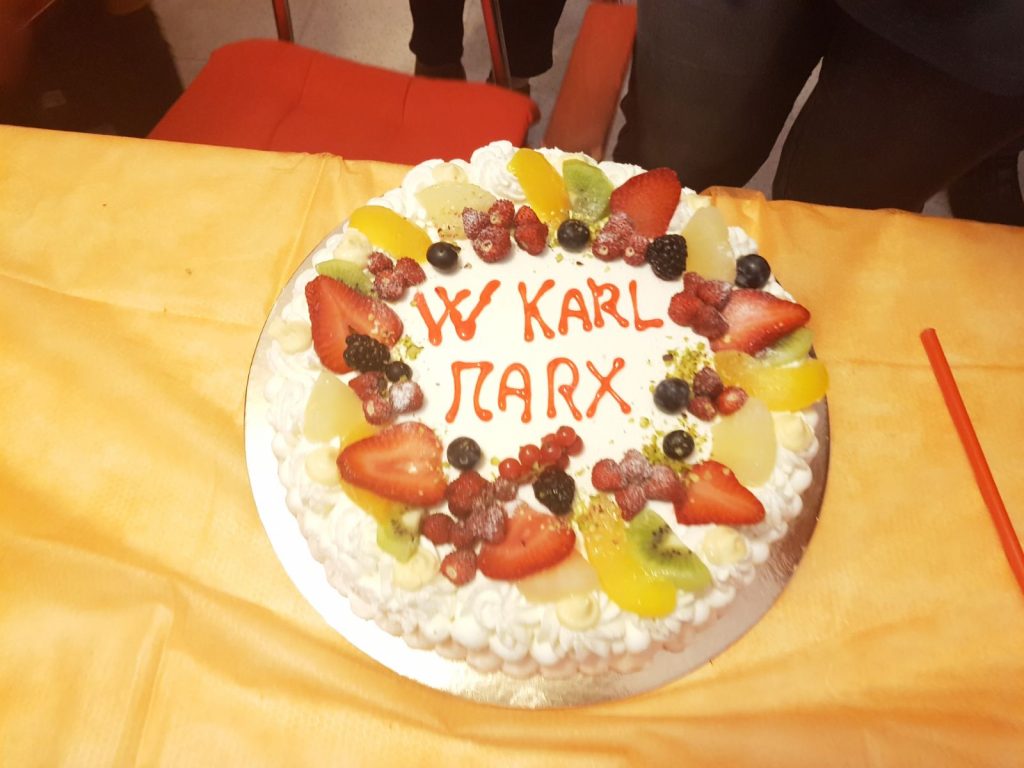 Marx says: “It is not my merit to have discovered the existence of the classes in modern society and their mutual struggle … what I did anew is: to prove that the existence of the classes is linked purely to certain historical phases of the development of production, that the struggle of the classes necessarily leads to the dictatorship of the proletariat, that this dictatorship itself constitutes only the passage to the abolition of all classes and to a society without classes”.
Marx says: “It is not my merit to have discovered the existence of the classes in modern society and their mutual struggle … what I did anew is: to prove that the existence of the classes is linked purely to certain historical phases of the development of production, that the struggle of the classes necessarily leads to the dictatorship of the proletariat, that this dictatorship itself constitutes only the passage to the abolition of all classes and to a society without classes”.
The class struggle has produced the evolution from the slave society to feudal society, later to bourgeois society, but every time the result of this overthrowing is the domination of a new class over another. It is the rule of the majority class of society, the working class, which puts an end to classes; this is what I said, concluded Marx.
Marx has very clear that his work has worth if is taken up by the working class. He does not look for no further verification. Marx laughs at the intellectuals who slander him and say clamorous falsehoods, and he enjoys so much to scoff and unmask them. His only point of reference is the working class. He has very clear that nothing of what he writes, of what he analyzes, can have a real outcome without the role of the working class.
He “discovers” the working class through the work Engels had done writing “The situation of the working class in England”, a beautiful book, a sort of labor investigation of that time under British capitalism, the most developed capitalism of the time. A book that in the description of the working condition of the time, seems to describe so much of today’s working condition. Whoever reads it says: it would take a book like this today, because the condition of the working class is analyzed in detail and shown without sparing anything.
Through Engels’ work, Marx understands that this is the problem, the working class, that all his work up to then would have made sense if he had found the class that could embody it. Because a society can not be erased by another idea of society but by a new class already existing within the old society and that already has in its hands the resources to create a new society.
From here, the Manifesto of the Communist Party will come first, then the Capital and all the rest.
But, once more, Marx is practical in his things. Where is the working class? Where is it right now? And through the information it accumulates it sees that the workers had already begun to struggle in several countries, they have formed an international organization called the League of the Just (or Justice), which was an organization half of “prophets of universal love” and half of daily fighters against exploitation. Marx decides that he must be there and the Manifesto is written at the request of this organization.
Marx had been ruthless in the criticism of certain prominent members of the League. This had hit the workers who then asked him: tell us how to do. So Marx, along with Engels, writes the Manifesto, that is adopted by the League of the Just, that in the meantime Engels had turned into Communist League, arguing: who are the just ones? What does just mean? There are workers and masters, exploited and exploiters, there are the capitalists and those who are called communists, and therefore either you are the capitalist league of or the communist league.
The transformation of the League of the Just into the Communist League, the release of the Manifesto of the Communist Party is the date of birth of our entire historical movement.
As soon as Marx starts working on this, as soon as he crosses the path of working class, he becomes its political chief, that is, the most advanced expression that the class had generated from its ability of political struggle, political program, and thought.
Writing the Manifesto, Marx returns to the workers what the class must be, not what it actually is.
This is perhaps the most serious problem we Communists have today, for a very simple reason: the workers’ generations that follow one another in history are born with a historical heritage, that are the struggles they have made, the struggles that there have been for many years, as a working class for at least two hundred years. This historical heritage produced by the class is as if it were within a “potential DNA” of today’s working class, but it is precisely a “potential DNA”. Exactly like the person who is born, who has within herself a DNA of all the best of the genes evolved in his family, and in turn his family comes from many others, and so on.
And the workers themselves, when they become not only fighters but also “passers” of their heritage, are called communists, they are called Workers’ Party, that has nothing to do with the form of workers’ parties we are used to see and in recent years we found exclusively through the degeneration of politics. Workers’ Party means partisan workers, workers who represent their class and play their role. Without a workers’ party, i.e. without a party that transmits the historical heritage of the workers, the workers are all “ignorant”.
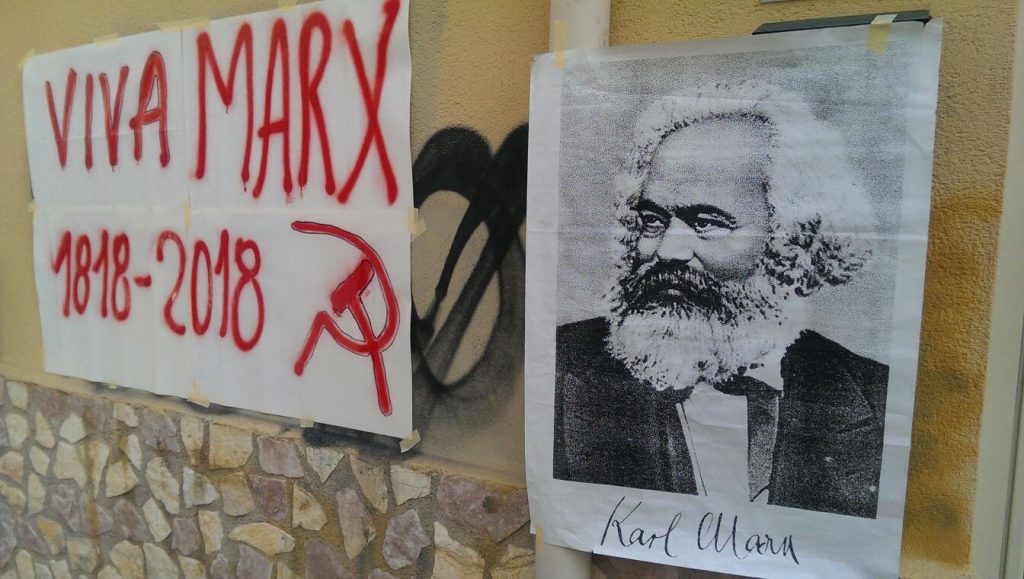 So, it is no wonder that the workers are ignorant. Marx never thought they were geniuses. In one of Marx’s works, “The misery of philosophy”, in which he criticizes Proudhon – who called himself worker, told of himself as a worker, thought of a worker’s society where all workers put themselves into a cooperative and exchange between themselves eggs with potatoes and so on – Marx, in analyzing his theory, explicitly says: the workers are not gods! They can play their historical role only as a class, and therefore the assessment, the knowledge which any individual member of the working class, or all together, have, does not matter, the workers exist when they fight and organize themselves as a class. It is in the struggle, in the class struggle, the genesis of the working class. The working class always exists, but it exists as a class only through the class struggle. It is what it does in the class struggle that matters, not what the individual worker thinks. So, out of the struggle, what the workers think does not matter at all, it is when the working class struggles that it shows its best characters, then it becomes a collective, the workers help each other, they are not afraid of the police …
So, it is no wonder that the workers are ignorant. Marx never thought they were geniuses. In one of Marx’s works, “The misery of philosophy”, in which he criticizes Proudhon – who called himself worker, told of himself as a worker, thought of a worker’s society where all workers put themselves into a cooperative and exchange between themselves eggs with potatoes and so on – Marx, in analyzing his theory, explicitly says: the workers are not gods! They can play their historical role only as a class, and therefore the assessment, the knowledge which any individual member of the working class, or all together, have, does not matter, the workers exist when they fight and organize themselves as a class. It is in the struggle, in the class struggle, the genesis of the working class. The working class always exists, but it exists as a class only through the class struggle. It is what it does in the class struggle that matters, not what the individual worker thinks. So, out of the struggle, what the workers think does not matter at all, it is when the working class struggles that it shows its best characters, then it becomes a collective, the workers help each other, they are not afraid of the police …
Marx’s work is aimed to this, to ensure that the working class struggles. And then? To do what?
Lenin says: Marx and Engels educated the working class to know itself, to become aware of itself, and they replaced chimeras with science. This is the point. Marx leads a great process of self-awareness of the class. He does not impose anything but tells the class how to understand its life, the reasons why its lives in those conditions, the why of things, what lies behind the appearance of society. Behind this appearance lies a substance, and Marx returns this substance to the workers so that the workers understand it.
A worker who understands who he is, that he produces everything but makes a life of suffering, that everything in the world, big and small things, luxury objects or kitchen knives are produced by a class that does not have nothing for itself, then the worker becomes a material force, theory takes hold of the working class and becomes a material force.
The theory of the working class is a material force, it is not a study to become some kind of intellectual and to be able to explain crises. Of course, we explain the crises but we do so to fight those who say that the crisis depends on that financier who has played everything on the stock exchange. The theory of crisis, into the hands of the working class, is the theory of anger, because in the crisis the rich become richer and the poor become poorer, the “theory” of the crisis is the “rebellion”.
Marx works for this. He explains the use value and exchange value because it is needed to understand how they are ripping off you , that when you go to work every day you produce at the same time, says Marx, wealth and misery: their wealth and your misery!
Marx allows us to have irreducible tools that no one can disassemble, no professor who says “yes, but you must take into account compatibility, Europe, welfare-State and so on” … Marx cleans all this mud and give the workers weapon of criticism.
But, at this point, Marx says: good! you finally understood, but, with the same sincerity, I tell you that you do not need only the criticism, if you do not turn the weapon of criticism into criticism of weapons, you will not be able to give an answer to your anger, to your rebellion, you will not change the things, neither the immediate situation or the future one.
So, when Engels says that Marx was a revolutionary he does not mean he was a militant activist just like the others. He was much more. Marx uses the whole set of weapons of philosophy, science, economy, physics to arm a class and make it capable to emancipate itself, because the emancipation of the working class or is realized by the working class itself or there is nobody that gives it. The communists are such when they understand this truth.
But the communists are sometimes bad people, one of them is good, ten go bad, because they follow a process completely opposite to that of Marx. Marx studied and returned science. The false communist takes from the workers and believes to be the subject. “Power to People” is: people struggle but I am the political chief. This is the false communist.
All the scientific work of Marx is aimed to demolish the false communists, already in its time. In the Manifesto of the Communist Party there is a chapter dedicated to socialists and communists, to criticize them, to show that all those ideas, first, have nothing to do with him and even less have to do with the working class, secondly, that the working class must take in its hands the struggle, not hand it over to politicians, or hand it over to “reds” or “greens”.
The working class party is its vanguard detachment.
Of course, the vanguard of the working class is always a fusion of those workers who through struggle and organization have understood something, and intellectuals who have betrayed their class.
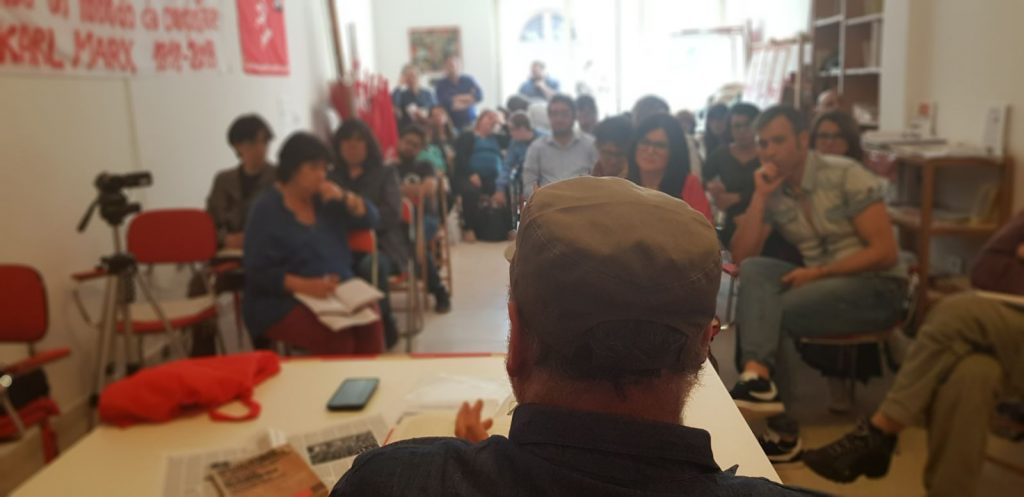 Society continuously generates intellectuals who betray their class. The ’68 has broadly showed it. Many students chose the revolution, participated and felt the wind of the East, the Chinese Cultural Revolution, came into contact with comrades who were already communists. The collective movements and individual randomness created a generation of intellectuals, revolutionary students ready to follow the path of Marx, that is the path of Lenin, Mao. But the key is that these revolutionary students later met the working class, put themselves at its service, not only to bring leaflets at the factories, but to really help the workers to grow, to understand that they had to do a lot more than what they were doing. And they did it. That is why in Italy there was the “hot autumn”, there were wonderful years, in which the workers came into the schools to explain the class struggle to the students; then in all the fields it was seen that it was possible to do things never done before, that it was possible to transform the universities from places of baronies and abstract notions into places where society, Marxism, revolutions were studied, thoughts previously considered as “dogmas” were put into discussions, for example what is psychiatry, what is medicine, etc.
Society continuously generates intellectuals who betray their class. The ’68 has broadly showed it. Many students chose the revolution, participated and felt the wind of the East, the Chinese Cultural Revolution, came into contact with comrades who were already communists. The collective movements and individual randomness created a generation of intellectuals, revolutionary students ready to follow the path of Marx, that is the path of Lenin, Mao. But the key is that these revolutionary students later met the working class, put themselves at its service, not only to bring leaflets at the factories, but to really help the workers to grow, to understand that they had to do a lot more than what they were doing. And they did it. That is why in Italy there was the “hot autumn”, there were wonderful years, in which the workers came into the schools to explain the class struggle to the students; then in all the fields it was seen that it was possible to do things never done before, that it was possible to transform the universities from places of baronies and abstract notions into places where society, Marxism, revolutions were studied, thoughts previously considered as “dogmas” were put into discussions, for example what is psychiatry, what is medicine, etc.
In this sense, many potential Marxist theorists can be generated by the class-divided society and its imperialistic-parasitic stage. But or at some point you meet the working class and are able to build that real movement that helps the working class to become Marxist, and then your work is useful, or your work is useless, and indeed is harmful, because in the class struggle there is no chance of being at half service. All those who put themselves at half service between working class and bourgeoisie, after a while go with the bourgeoisie.
For us, the taking up the giant work of Marx is first of all to understand where we come from, what we are, who we must serve..
This is the problem that even Marx found. After he was able to impose in the League of the Just and later in the First International that there is only one science of the working class, which is the one he had elaborated, and that all the rest are fables, he himself dissolved the First International because, he wondered, what purpose does it serve? We must go among the proletarians. Now, if this science does not go into the hands of the workers, we are always at the same point. Here the role of Engels will be decisive.
Because Engels is gigantic in his work of spreading Marxism. After Marx’s death, Engels took the task of spreading Marxism. And it did it really well. After Marx’s death and the dissolution of the First International we witness the birth of Marxist parties all over the world.
The second International shows how Marxism had become a worldwide phenomenon. The reference to Marx’s theories had become universal for all those who call themselves communists and all those who take side with the working class. Engels’ role in spreading Marx’s thought is extraordinary. Even Marx knew very well that individual thought is not enough, if you do not have those who publish books, organize distribution, those who around all this build contacts, links. Because communism and Marxism are material force only if they are handed into the hands of suitable subjects to make them material force.
In this battle the struggle always starts from zero, because not all those who refer to Marxism, for this fact itself, are good and all those who do not refer to Marxism are bad. Their position is not a thing once and for all. It is also natural that everyone adapt Marxism to own social class, the way of thinking that somehow already has. This way it is evident that within what is called Marxism a whole series of ideas are inserted that are not Marxist, that are not communist and therefore, in order to advance the science of Marxism, it is necessary to clean it up, as Marx did.
For his whole life, Marx makes a clean sweep, first in Germany with the Hegelian left, then in the League of the Just, then in the International. This man was always angry with everyone. Every time, after every speech, he said: “Stop! What are you saying? Is the property a robbery? It is not enough! The property has been transformed: from the property of the slaves, to the feudal property, and so on “…
How can we think that without Marxism we can have an alternative view of the world, that without the social class that produces everything and by freeing itself will free the whole of humanity, can we have an alternative society?
The alternative society is not the happy island, an atoll in the Maldives where we all can go and live. It is the transformation of the cities in which we live, the transformation of Italy. These transformations are possible only with the weapon of Marxism. We understand them only if we use Marxism as a real weapon, like a pickax, then we can change this society.
The 200 years since Marx’s birth tell us that this science, theory, politics, practice of Marx are the strategic indication we need.
The only issue we need to be aware of is that we must become the carriers of these transformation and strategic weapons. But we are not such vectors, not enough. The communists are often part of the problem, rather than part of the solution. This is our issue, an issue fully of our own.
The new workers generation must rediscover Marx. The rediscovery by the bourgeoisie helps us in this task. But our problem is the rediscovery of Marx by the working class. This can not be done by the bourgeoisie. The bourgeoisie has created its gravediggers but is well equipped to prevent them from acting, is willing to pay any price of barbarism or massacres to prevent that happening.
Thus, the rediscovery of Max by the communists is our problem. A rediscovery that becomes the rediscovery of Marx by the working class, by a generation of working class that is not born fully formed and despite having it in the DNA of its economic and social condition does not have in the brain the key of the “artificial intelligence” that is Marxism. “Artificial intelligence” is a word that Marx would have used because in another text Marx explains how the exploitation of slaves is “natural”, but the exploitation of the workers is “artificial”. In the sense that it is illegitimate and unjust, it is counter-nature compared to the needs of society, which should make labor the vehicle of development, wealth, to reduce the burden of labor.
And it is still Marx who has explained to us where this is hidden that is a curse. In the writings of Marx’s youthful phase, those will lead to the finished product called The Communist Manifesto and the rest of his work, Marx writes: since everything is transformed into commodities, thereby we have the devaluation of the world of men. The worker finds himself alienated four times.
He is alienated from the product: the product of the worker becomes an oppressive extraneous power, such as to create the cretinism of the craft, the degradation of the worker. The cretinism of the craft is what makes him believe that once he produces a product, his worth is that of the product.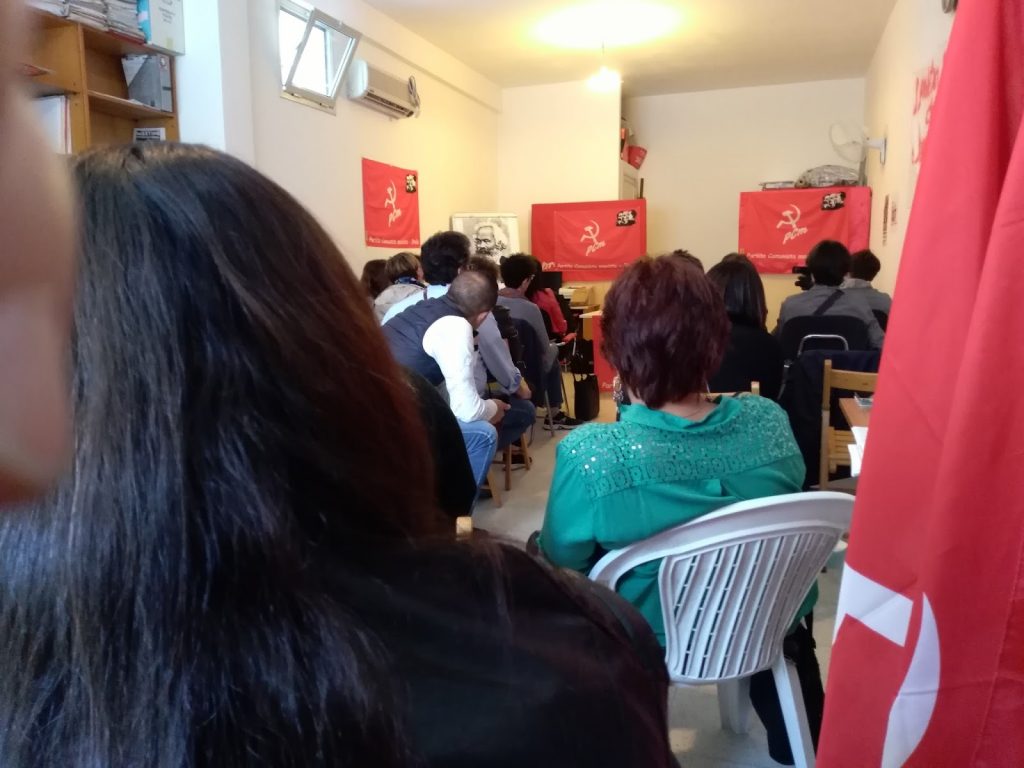
He is alienated from the purpose: work is imposed, the worker is subordinate to it, the worker is realized only in reproducing himself – but this, if resembles to something, is the condition of the beasts.
He is alienated from nature: work transforms nature but the worker is not master of it and therefore does not enter into a conscious relationship with the transformation of nature – and this is the basis for which labor in the hands of the capitalist destroys nature. Nature it appears to him external and its transformation as something that does not concern him, except as exploited and victim of the its devastation. The dehumanized worker does not measure his function towards nature.
He is alienated from society: another man, a stranger to the worker, is the master of his work, the worker is forced to see in the other for whom he works an enemy. The worker, reduced to labor force in a production for its own sake does not produce for the actual social needs of the masses and therefore the production itself is not what he need, because it does not own the work it does.
This fourfold alienation reveals the secret of why the whole society holds itself on the working class. It holds istelf on the combination between the alienation of the working class and its false conscience. And the intertwining between false conscience and exploitation of work transforms the work into a curse, into an aspiration for those who do not have a job and a curse for those who have, because it chains them, instead of freed work, the work becomes chains. And we have the absurd that half of the population can not wait to be chained to work, otherwise they die of hunger,and the other is so chained by that work that can not live, and in the imperialist stage of putrefaction of capitalism not only one can not live by work, but it becomes a factor of death.
In this context, how do we advance without the use of Marx, without personally participating in a process of not acculturation, but self-consciousness of the workers? And Marx has taught us that it is not an individual consciousness, not psychoanalytic sessions to which the worker has to submit, it also is class struggle, a participation in the class struggle. Without participating in the class struggle, workers can not grow in consciousness. By participating in the class struggle, workers should not be taken as individuals but as a collective subject of the class struggle and only in this form they perform the historical function that Marx attributes them and puts in definitive terms in the last sentence of the Manifesto: “The proletarians have nothing to lose but their chains. They have a world to win!”
When Marx wrote this he knew that it is the keystone of his work. From the labor-pains of this society in agony a new society is born, able to overcoming the social death, the death of a system of production that fails to change things not only for the working class as a whole but for every single member of this class, and not only of this class but of all those classes apart the handful of people who have everything in their hands.
Thus, it is important that we do not see this 200th anniversary as just a celebration. If today we can not take Marx back to us, rediscover him and make the class to discover him, we have nothing to celebrate. Our celebrations, even when are made with smiling faces and red flags, risk to be just “funeral” ceremonies.
We must be able to say that time is now!
We must feel all these 200 years on our shoulders, with their richness but also as an opportunity to really make that qualitative leap we communists, we workers, we proletarians, we world, need. Otherwise, where we are going? On the horizon there is a third world war, the barbarity of environmental devastation, the degradation of politics.
Therefore, we must take back Marx, because we must help the working class to rediscover him and make him the instrument of its own conscience. When we are able to achieve serious results on this, not a single worker who is a comrade but a class sector we win, factory by factory, workplace by workplace, then Marx’s message will be a blunt weapon.
If we can take these steps, we will have invincible weapons. There are conditions to turn our rhetorical phrases into actual reality. A reality for which it is worth to live. Because a life as revolutionary, a life as communists, a life as struggling proletarian is not and must not be only sacrifice and repression, it must have the satisfaction, the pride of feeling part of a movement that is really changing society.
Well, if we realize that we are doing this, that we have to do this, that this is possible, then really Marx lives!
PCm – Italy
5th of May, 2018

Source: http://maoistroad.blogspot.com/2018/05/for-debate-unofficial-speech-by-pcm.html

